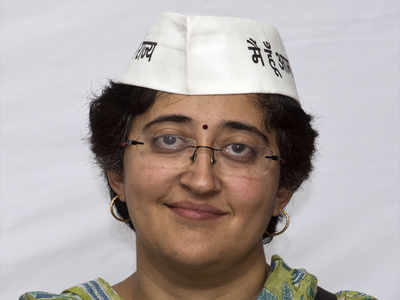
Atishi Marlena
AAP has added 8,000 classrooms and is building 12,000 more
Education as an election issue
After AAP came to power, Delhi saw for the first time a substantial difference in education. People on the ground will tell you what good work has happened in education. Delhi draws migrants who come here because they want their children to have a better life through better education. But the same people, thanks to Mr Lovely and Sheila Dikshit, had been subjected to a future hobbled by a shortage of classrooms and teachers.
Challenges in education
When I first walked into a government school four years ago, I remember smelling the toilet from 50 metres away. Due to shortage of classrooms, the students still had classes near such toilets. If you cannot provide a child a clean toilet, drinking water, classroom, desk and a fan in the heat, how can you give them good education?
The infrastructure issue is related to a child’s self-worth. If kids walk into derelict classrooms, they feel they are second-class citizens and only those attending swanky schools have a future. One of the things I notice now is the change in the body language of government school students. They are more confident.
Higher education & 50% reservation for Delhiites in DU
Some years ago, the Congress government began funding 28 new colleges, 12 of them 100%. But even in these colleges, students from other states are admitted. A Delhiite in Bengaluru or Mumbai has to compete for the 15% all-India seats because 85% are reserved for Karnataka residents. So where do Delhi students go when there aren’t enough seats in Delhi for them?
You can’t reserve seats for Delhi students and yet you can’t open new colleges because the DU Act prohibits other affiliating universities in the capital. Indraprastha University was a one-time exception made possible by amending the DU Act in Parliament. We don’t want to keep non-Delhiites out of Delhi colleges, but we have to help the 2.5 lakh students passing out of Class XII every year in the city. Most government school graduates go to School of Learning because there aren’t enough seats in colleges, even when they get 80% — which is a big deal for a child from a poor economic background.
In school education we are on an upward path. The real change needed is in higher education and that can be achieved only if Delhi gets full statehood.
Education under AAP and Cong
When AAP assumed power, government schools had 17,000 classrooms. Since 2015, AAP has added 8,000 classrooms and is building12,000 more. This shows our government cares for education and believes in improving schools because more than 60% of Delhi’s students study in govt schools.
Till 2015, the trend was of students moving from government to private schools. Now you see a shift from private to government schools. You can ask a student in Class XII what change he or she has seen in schools.
Why has the number of children enrolled in government schools fallen?
Education as an election issue
AAP has increased the budget allocation for education in Delhi. For whom is this meant? The children, of course. But do you know in 2013, the number of children enrolled in government schools was one lakh more than now? Has the population of Delhi increased or decreased these past few years? Why has enrolment in government schools decreased? This means the increase in the education budget is only to help the contractors.
I give an open invitation to the AAP government — let’s visit any government school other than the 15-20 showcase institutions. We will see the real situation of education there. More children are attending private schools now. If this is reform, then AAP should be ashamed of it.
Challenges in education
What AAP is doing in government schooling is a crime against the coming generation. When we took over in Delhi in 1998, the dropout rate was 7.1%.
When I demitted office in 2013, the dropout rate had slid to 1.7%. For the first time in Delhi’s history, the rate has climbed to 3.1%. And they call this doing good in education.
Higher education & 50% reservation for Delhiites in DU
How many colleges has AAP opened? It is not possible to have 85% reservation for Delhi children in DU because it is a central university.
Ambedkar University and Guru Gobind Singh Indraprastha University were started in our tenure with a vision of having colleges affiliated to them. What happened to this?
Education under AAP and Cong
It is unfortunate that AAP is doing politics on education. When I was the education minister, It told even my party MLAs, and this is on record in assembly proceedings, not to interfere in education. Let the educationist run education. Atishi Marlena was a consultant for the education department just as other departments have consultants. That doesn’t mean such consultants and advisors run the department and so can take credit for their work. This itself is unfortunate, but I also want to question what she is taking credit for.
Who started EWS admissions in Delhi? Not AAP, because despite opposition within my own party, I decided it. Who decreed the norms for admission in public schools? I decided that admission couldn’t be the prerogative of solely the school principal. I decided on the neighbourhood criterion for admission in 2003-04, but AAP is claiming credit for this.
Who began the auditing of public school accounts? The Congress government derecognised the biggest public school in Delhi on an audit issues. Can AAP give me the name of one school it has derecognised? They are only blackmailing or threatening middle lower schools.
I also introduced the No Detention Policy till Class VIII before the RTE Act came into being. RTE was drafted following the success of Delhi education. But they are claiming everything now.
 Techosta Where Tech Starts From
Techosta Where Tech Starts From